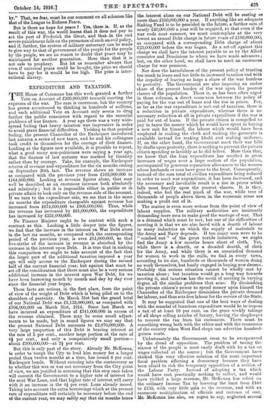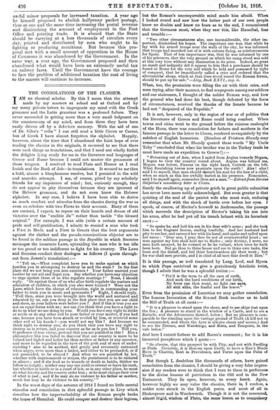EXPENDITURE AND TAXATION. T HE House of Commons has this week
granted a further Vote on Account of /300,000,000 towards meeting the expenses of the war. The sum is enormous, but the country has grown accustomed to thinking in hundreds of millions, and each additional Vote on Account only seems to drug further the public, conscience with regard to the essential problems of war finance. A year ago there was a very wide- spread feeling that heavy taxation was imperative in order to avoid grave financial difficulties. Yielding to that popular feeling, the present Chancellor of the Exchequer introduced last autumn a series of new taxes, and he and his colleagues took credit to themselves for the courage of their finance. Looking at the figures now available, it is possible to repeat, what a good many non-politicians were saying a year ago, that the finance of last autumn was marked by timidity rather than by courage. Take, for example, the Exchequer returns of revenue and expenditure for the six months ending on September 30th last. The revenue shows an increase as compared with the previous year from /103,000,000 to £164,000,000. Looking at revenue figures alone, that may well be described as an enormous increase both absolutely and relatively ; but it is impossible either in public or in private affairs to look only on the revenue side of the account. If we turn to the expenditure side, we see that in the same six months the expenditure chargeable against revenue has increased from 1674,000,000 to 1905,000,000. Thus, while the revenue has increased by /61,000,000, the expenditure has increased by £231,000,000.
No Finance Minister ought to be content with such a contrast as this. Looking a little deeper into the figures, we find that the increase in the interest on War Debt alone In the last six months, as compared with the corresponding period of the previous year, is over /51,000,000, so that five-sixths of the increase in revenue is absorbed by the increase in the interest upon Debt. It is true that in making this comparison we ought to take account of the fact that the larger part of the additional taxation imposed a year ago will only accrue to the Exchequer during the second half of the current financial year, but against that must be set off the consideration that there must also be a very serious additional increase in the interest upon War Debt, for we have been borrowing month by month and day by day ever since the financial year began.
These facts are serious, in the first place, from the point of view of the weight of Debt which is being piled on to the shoulders of posterity. On March 31st last the grand total of our National Debt was £2,133,000,000, as compared with £706,000,000 on March 31st, 1914. Since last March we have incurred an expenditure of £741,000,000 in excess of the revenue obtained. There may be some small adjust- ments to be made, but in round figures we may say that the present National Debt amounts to 12,870,000,000. A very large proportion of this Debt is bearing interest at the rate of 5 per cent. another large portion at the rate of 4i per cent., and only a comparatively small portion— about /300,000,000—at 2i per cent.
But this is only part of the story. Already Mr. McKenna, In order to tempt the City to lend him money for a longer period than twelve months at a time, has issued 6 per cent. Exchequer bonds. Without entering into the controversy as to whether this was or was not necessary from the City point of view, we are justified in assuming that this step once taken will commit the Government to a higher rate of interest for the next War Loan, and that higher rate of interest will carry with it an increase in the 4 per cent. Loan already issued. Taking into account the extra borrowings which at the present rate of expenditure will certainly be necessary before the end of the current year, we may safely say that six months hence- ence the the interest alone on our National Debt will be coating us more than /150,000,000 a year. If anything like an adequate Sinking Fund is to be provided in the future, a further sum of nearly 00,000,000 a year will be required, so that even if the war ends -next summer, we must contemplate at the very lowest an annual Debt charge in future years of 1190,000,000, as compared with a corresponding Debt charge of about /23,000,000 before the war began. As a set-off against this charge we shall have the interest payable to us by the Allied countries and Dominions to whom we have made advances ; but, on the other hand, we shall have to meet an enormous- charge for war pensions.
Nor does the harmfulness of the present policy of trusting too much to loans and too little to increased taxation end with the impolicy of leaving so large a share of the war burdens to posterity. The Government are also imposing an undue share of the present burden of the war upon the poorest classes of the population. There is, as has been often urged in these columns, a direct connexion between the policy of paying for the war out of loans and the rise in prices. For, so far as the war expenditure is met out of taxation, there is a reduction in private, expenditure, whereas there is no necessary reduction at all in private expenditure if the war is paid for out of loans. If the private citizen is compelled to pay in taxes the money which he would have spent in buying a new suit for himself, the labour which would have been employed in making the cloth and making the garments is available instead for making khaki and making uniforms. If, on the other hand, the Government meet their war bills by drafts upon posterity, there is nothing to prevent the private citizen spending as lavishly as he did before. More than that, we know that the loan expenditure has resulted in great increases of wages over a large section of the population, accompanied by generous separation allowances to the women whose husbands or sons have gone to the front. Consequently, instead of the sum total of civilian expenditure being reduced in order to meet war expenditure, it has been increased, and the necessary and inevitable result is a rise in prices which falls most heavily upon the poorest classes. It is they, indeed, who feel the real pinch of the war, while tens of thousands of people above them in the economic sense are making a profit out of it.
The matter is even more serious from the point of view of labour supplies. The military authorities are insistently demanding more men to make good the wastage of war. That is a demand which must be met, but one of the difficulties of meeting it is that we are also faced with a dearth of labour in many industries on which the supply of materials to the Army and Navy depends. If too many men were to be "combed, out" of the great textile industries, we might find the Army a few months hence short of cloth. Yet, while there is . a dearth, or a dreaded dearth, of cloth for the . Army, and while there is an unsatisfied demand for women to work in the mills, we find in every town, according to its size, hnnelreds or thousands of women doing no work themselves, but busily engaged in buying new dreases. Probably this serious situation cannot be wholly met by taxation alone ; but taxation would go a long way towards- meeting it, and taxation has the merit of meeting in varying degree .9.11 the similar problems that arise. By diminishing the private citizen's power to spend money upon himself the Chancellor of the Exchequer diminishes the private demand fer labour, and thus sets free labour for the service of the State.
It may be suggested that one of the best ways of dealing with the scandal of luxurious expenditure would be to impose a tax of at least 10 per cent. on the gross weekly takings of all shops selling articles of luxury, leaving the shopkeeper to recover the tax - from his customers. There must be something wrong both with the ethics and with the economics of the country when West End shops can advertise hundred- guinea coats.
Unfortunately the Government seem to be overpowered by the dread of opposition. The problem of taxing the masses of the people is most easily dealt with by a tax on wages collected at the source ; but the Government have shirked this very effective solution of the most important fiscal problem affecting a democracy because they have been afraid to risk the temporary opposition of a section of the Labour Party. Instead of adopting a tax which would have cost practically nothing to collect, and would have yielded a large revenue, Mr. McKenna has relied on the ordinary Income Tax by lowering the limit from £160 to £130, with very little gain to the revenue, and with an enormous multiplication of officials and increase of cost. Mrs Dielienna has also, we regret to say, neglected several usthil minor proposals for increased taxation. A year ago he himself proposed to abolish halfpenny packet postage, thus at one and the same time increasing the postal. revenue and diminishing the amount of employment in the Post Office and printing trade. It is absurd that the State should be carrying at a loss thousands of circulars every day, printed and distributed by men who ought to be fighting or producing munitions. But because this pro- posal met with a small amount of opposition in the House of 031111110113 it was abandoned by the Government. In the same way, a year ago, the Government proposed and then abandoned what would have been an extremely useful tax on railway fares. Until the Government have the courage to face the problem of additional taxation the cost of living to the masses will continue to increase.



































 Previous page
Previous page